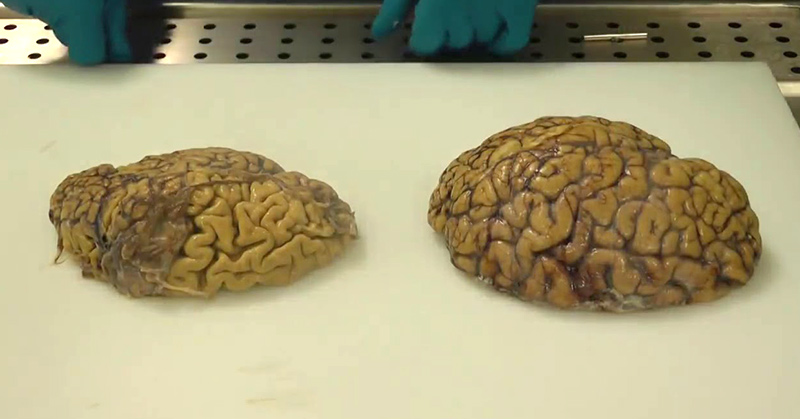Dementia is a difficult disease to deal with, both for the person who has it and for their loved ones. There are many types of dementia, some of which include Parkinson’s disease, Creutzfeld-Jakob disease, Huntington’s disease, and Wernicke-Korsakoff Syndrome.1 But Alzheimer’s disease is by far the most well-known and common form of dementia. With its progression impacting memory, thought processes, and language abilities, it’s crucial to explore preventive measures. While there’s currently no cure for Alzheimer’s, its effects can be devastating. Thankfully, there are lifestyle changes you can make to help with Alzheimer’s prevention. In the U.S., Alzheimer’s in particular is the 6th leading cause of death and 5.7 million Americans are living with Alzheimer’s today.2 The risk of developing Alzheimer’s doubles every decade after the age of 60.3 Women develop the disease more often than men, which can be partially attributed to the fact that they live longer lives.
Read More: 10 Medications Linked to Dementia
Alzheimer’s Symptoms – What To Look Out For

Alzheimer’s is a gradual process; it doesn’t just happen overnight. Alzheimer’s involves a decline in cognitive and behavioral function that interferes with your ability to function in day-to-day life. It is characterized by changes in the brain—including amyloid plaques and neurofibrillary, or tau, tangles, which lead to a loss of neurons.
Some telltale signs of Alzheimer’s include:

- A reduced ability to take in and remember information
- Impaired spatial awareness
- Personality changes
- Impaired reasoning abilities
- Difficulty speaking, writing, and reading
What Causes Alzheimer’s?

The pathogenesis of Alzheimer’s is multifaceted. In recent years, some have dubbed Alzheimer’s “type 3 diabetes” because insulin signaling plays an important role in the development of Alzheimer’s.4 Individuals who are insulin resistant, have type 2 diabetes, obesity, or other metabolic diseases have an increased risk for developing a few forms of dementia, including Alzheimer’s.5 This finding supports the theory that cardiovascular health and brain health are connected, something that professionals have suspected for many years.6
Maintaining good blood vessel health is essential to preventing Alzheimer’s disease

Poor maintenance can lead to high blood pressure, which can damage blood vessels in the brain and affect your memory and thinking.7 Cardiovascular diseases and Alzheimer’s disease are also both characterized by elevated blood levels of homocysteine, an amino acid that is affected by dietary intakes of vitamins B2, B6, B9 (folic acid), and B12.8 Another factor that plays a role in the development of Alzheimer’s disease is genetics. If a relative in your immediate family, such as your sibling or parent, has Alzheimer’s, you have an increased risk of developing the disease. However, not everyone with a genetic risk develops the disease. Preventing Alzheimer’s and reversing the memory loss that comes with it is possible through lifestyle changes. Here are 8 Ways to Prevent Alzheimer’s Disease:
Read More: Five Red Flags in a Person’s Driving That Could Be Signs For Dementia
1. Exercise Regularly

Incorporating physical activity into your routine can significantly benefit brain health. Dr. Gad Marshall, from the Center for Alzheimer Research and Treatment, recommends engaging in 30 minutes of moderately vigorous aerobic exercise, three to four days per week.9
2. Follow a Mediterranean Diet

Studies suggest that adhering to a Mediterranean diet, rich in fresh fruits, vegetables, whole grains, nuts, and olive oil, may help prevent Alzheimer’s or slow its progression.
3. Prioritize Quality Sleep

Try to aim for seven to eight hours of sleep each night. Research indicates that improved sleep can aid in preventing Alzheimer’s disease and is linked to greater clearance of amyloid from the brain.
4. Engage in Mental Stimulation

Keeping the brain active with activities like reading, solving puzzles, or learning new skills may contribute to building cognitive reserve and reducing the risk of Alzheimer’s disease.10
5. Foster Social Connections

Maintaining social engagement can have protective effects against Alzheimer’s disease. Studies show that individuals with high or increased social engagement have lower chances of dementia.
6. Limit Alcohol Intake

While moderate alcohol consumption may have some benefits, excessive drinking can pose risks. It’s essential to drink alcohol in moderation or avoid it altogether if you’re serious about brain health.
7. Manage Chronic Conditions

Effectively managing conditions like high blood pressure, diabetes, and obesity can contribute to reducing the risk of Alzheimer’s disease. Regular medical check-ups and adhering to treatment plans are crucial.11
8. Seek Cognitive Screening

If you notice persistent memory changes or cognitive decline, consult a medical professional for an evaluation and screening. Early detection allows for timely interventions and potential prevention strategies.
The Bottom Line

There are many factors that contribute to the development of Alzheimer’s disease and the best way to prevent it is to address the root causes. While Alzheimer’s does present significant challenges, proactive steps can be taken to lower the risk of its onset. Adopting the above approaches can empower you in the fight. Remember, it’s never too early to start implementing these preventive measures for better brain health and overall well-being. Making the right lifestyle changes early on will give you and your brain the best chance at a healthy future.
Read More: A Natural Approach To Early-Onset Dementia
Sources
- “Types of Dementia.” ALZ
- “Alzheimer’s Disease Facts and Figures.” ALZ
- “Alzheimer’s disease.” Mayo Clinic
- “Alzheimer’s Disease Is Type 3 Diabetes–Evidence Reviewed.” NCBI. Suzanne M. de la Monte, M.D., M.P.H.and Jack R. Wands, M.D. November 2008.
- “Insulin Resistance and Alzheimer’s Disease: Bioenergetic Linkages.” NCBI. Bryan J. Neth and Suzanne Craft. October 31, 2017.
- “Is cardiovascular health the key to protecting the brain against dementia?.” Center for Brain Health. October 10, 2017.
- “Blood Pressure and Alzheimer’s Risk: What’s the Connection?” Hopkins Medicine
- “Alzheimer’s disease: still a perplexing problem.” BMJ. 2014.
- “What can you do to avoid Alzheimer’s disease?” Harvard. July 31, 2019.
- “Steps to Take for Alzheimer’s Disease Prevention.” Healthline. Wendy Leonard, MPH. February 21, 2023
- “Reducing Risk of Alzheimer’s Disease.” CDC.

